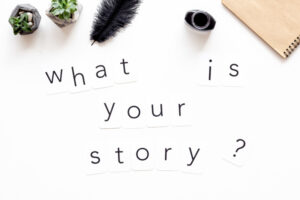Stories are the language of the heart. We learn many important lessons through stories. It has been said that if you want to really know someone, you need to know their story.

From the story of Exodus to Dr. Seuss, myths, legends, parables, and stories slide in sideways to give us advice, share information, and teach moral lessons without being told directly what to do.
Most of us are not expert storytellers but we can nurture our own sense of who we are, deepen our understanding of ourselves, and find the meaning of our lives by telling stories. We can deepen our
understanding of others by listening to their stories.
We can remember details from times in our lives better if it is told in story form. The time your son got a peanut up his nose, your wedding, your divorce, a vacation. Stories are often brought up again and again, each time perhaps adding or subtracting some piece of information or misinformation.
The poet Barry Lopez said: “Sometimes a person needs a story more than food to stay alive.”
It is especially important during hard times to think about your story to help make sense of what has happened and what can be learned.
Here is a guide adapted from the work of Rachael Freed, author of Your Legacy Matters, for writing your story. It provides structure for making story writing easier. It can be done in one page, writing for no more than 15 minutes, and can be accomplished in four paragraphs.
- Context: Provide the history and context of your story. Give a snapshot of the historical time it took place. It will enrich the story that follows.
- Story: Tell the story. All of us have stories, and all of us want to tell our stories. It is by writing our stories that we feel known and have a sense of belonging. The story may be about anything you want to preserve and pass on.
- Lesson: The story is not as meaningful as it can be unless you write what you learned from your experience. Write the lesson learned from the story. Learning from your experience is commonly defined as wisdom.
- Gift to Others: From what you have learned from your story and experience, what would you like to tell or give to others.
- Reflection: Review the stories in your life that stand out and what you’d like to explore further.
Telling another person or writing our stories helps us make sense of our lives.
The author Christina Baldwin writes: “Every person is born into life as a blank page – and every person leaves life as a full book. Our lives are our story, and our story is our life.”
